Demolition Contractors Northwood
Best Demo Contractor in Northwood
Get 3 FREE Building Demolition quotes for your project today! Compare profiles, reviews, accreditations, portfolio, etc... and choose the best offer.
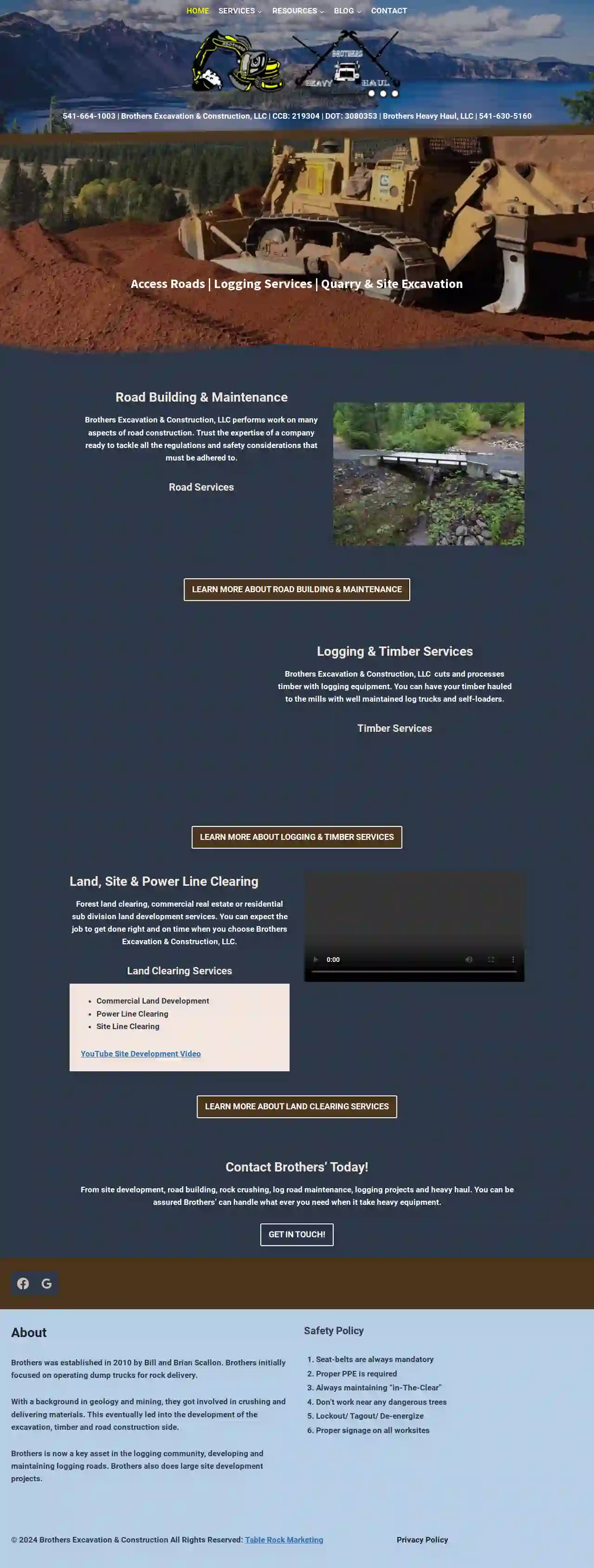
Brothers Excavation & Construction, LLC
Portland, USRoad Building & Maintenance Brothers Excavation & Construction, LLC performs work on many aspects of road construction. Trust the expertise of a company ready to tackle all the regulations and safety considerations that must be adhered to. Logging & Timber Services Brothers Excavation & Construction, LLC cuts and processes timber with logging equipment. You can have your timber hauled to the mills with well maintained log trucks and self-loaders. Land, Site & Power Line Clearing Forest land clearing, commercial real estate or residential sub division land development services. You can expect the job to get done right and on time when you choose Brothers Excavation & Construction, LLC. About Brothers was established in 2010 by Bill and Brian Scallon. Brothers initially focused on operating dump trucks for rock delivery. With a background in geology and mining, they got involved in crushing and delivering materials. This eventually led into the development of the excavation, timber and road construction side. Brothers is now a key asset in the logging community, developing and maintaining logging roads. Brothers also does large site development projects. Safety Policy Seat-belts are always mandatory Proper PPE is required Always maintaining “in-The-Clear” Don’t work near any dangerous trees Lockout/ Tagout/ De-energize Proper signage on all worksites
- Services
- Why Us?
- Gallery
Get Quote
High Idle Excavation
Farmingdale, USIntroducing High Idle Excavation Finding a reliable excavation contractor is crucial to the success of your project. Our experienced team at High Idle Excavation is here to make the process smooth and straightforward, turning your vision into reality with precision and efficiency. Based in Farmingdale, NY, we pride ourselves on being a locally owned and operated business, dedicated to delivering top-quality excavation services for residential and commercial clients. We offer an extensive range of services, which include expert land clearing, detailed site preparation, and precise grading and regrading. Whether you're looking to clear snow, or remove a parking lot or pool, we have the expertise and equipment to get the job done right. Our trenching and utility work ensure that your infrastructure projects are in capable hands, while our bobcat and demolition services provide the heavy-duty solutions needed for larger tasks. What sets us apart is having a comprehensive service portfolio and unwavering dedication to customer satisfaction. We offer free estimates and 24/7 emergency service calls, so no matter the time or the challenge, we're here for you. Our commitment to affordable, high-quality work means you get the best value without compromising on excellence. With a focus on friendly customer service and rapid project completion, we aim to make your excavation needs manageable and stress-free. Licensed and insured, High Idle Excavation stands ready to tackle all your excavation challenges with the professionalism and care you deserve. If you need top-notch excavation services in Farmingdale, NY, from site clearing to construction demolition, we invite you to reach out to us. Let us help turn your improvement plans into reality. Contact High Idle Excavation today to get started. Our Services Tackle your excavation project with confidence by calling High Idle Excavation at (516) 988-6600. Discover why we are the trusted excavator in Farmingdale, NY. Let's transform your property into a more usable space today! * Excavation Contractor * Excavating Services * Land Clearing * Snow Removal * Parking Lot Rip Outs * Pool Rip Outs * Trenching * Utility Work * Site Clearing * Demolition Services * Bobcat Services * Land Demolition * Grading Services * Regrading Services * Resloping Services * Site Preparation * Building Site Preparation * Construction Site Preparation * Construction Demolition * Equipment Rental * Equipment Transportation
- Services
- Why Us?
- Gallery
Get Quote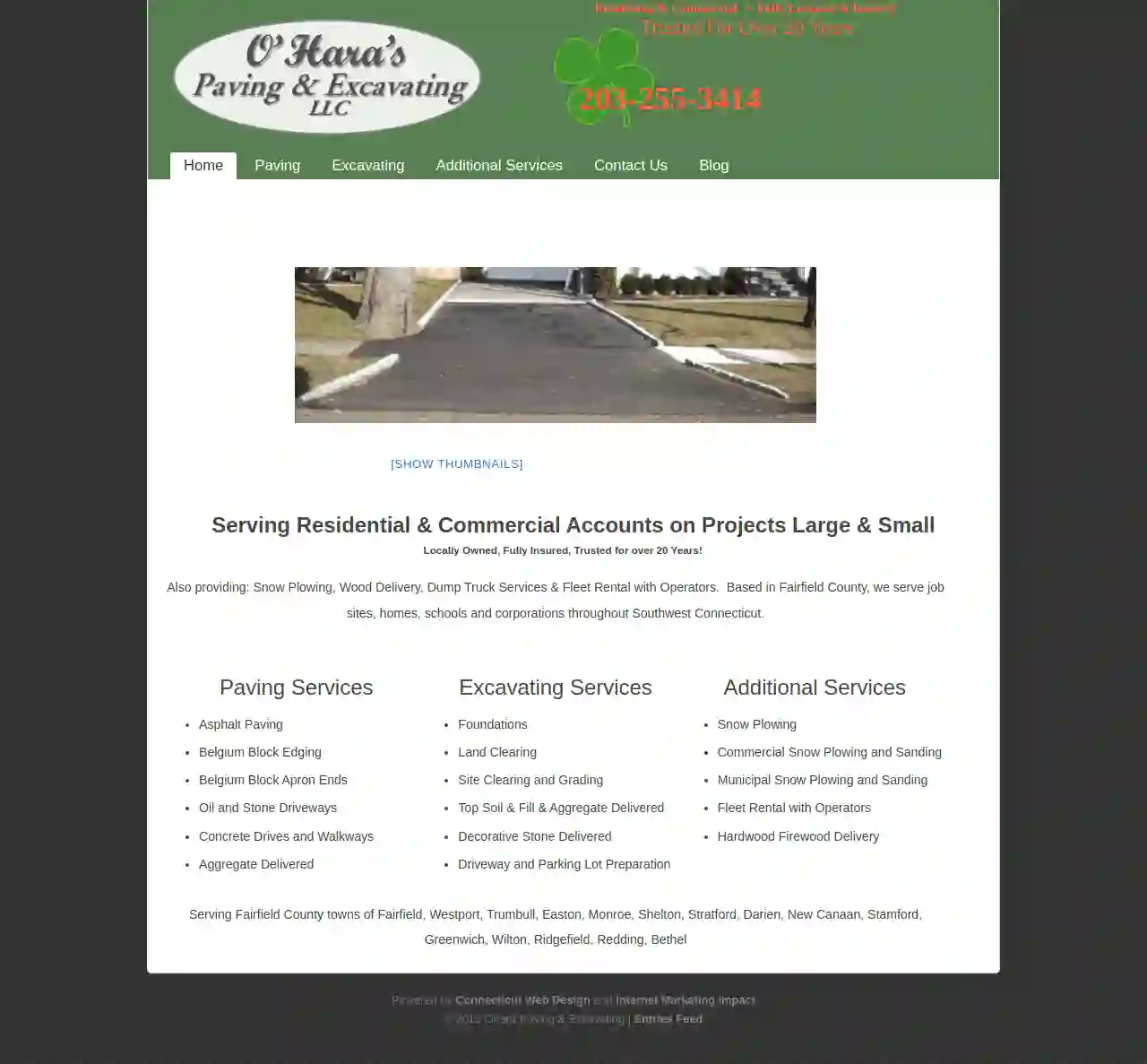
O'Hara's Paving & Excavating
Fairfield, USOhara Paving & Excavating Serving Residential & Commercial Accounts on Projects Large & Small Locally Owned, Fully Insured, Trusted for over 20 Years! Also providing: Snow Plowing, Wood Delivery, Dump Truck Services & Fleet Rental with Operators. Based in Fairfield County, we serve job sites, homes, schools and corporations throughout Southwest Connecticut.
- Services
- Why Us?
- Gallery
Get Quote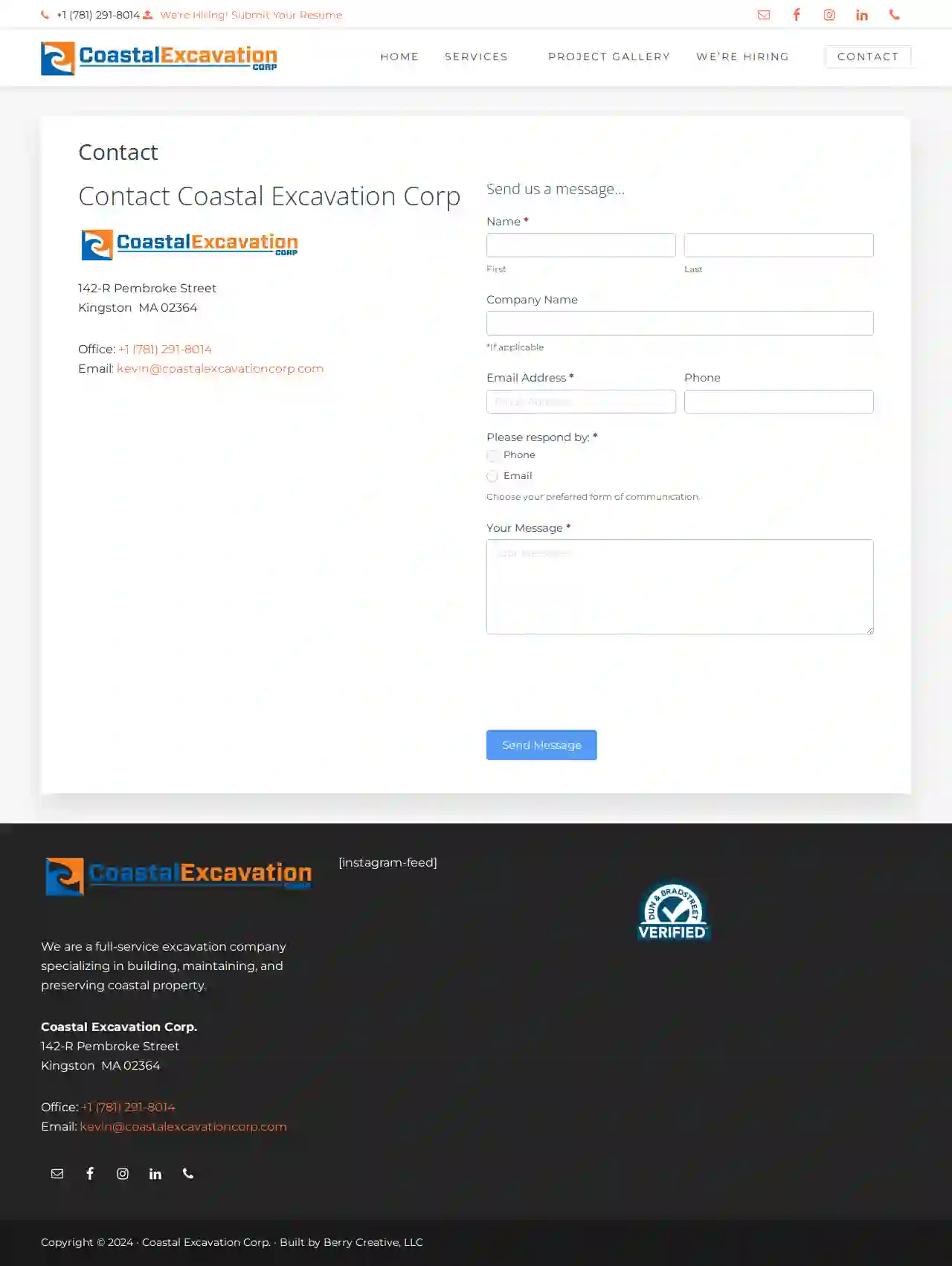
Coastal Excavation Corp
142-R Pembroke Street, Kingston, 02364, USWelcome to Coastal Excavation Corp. Site Development • Landscape Construction • Property Management A full-service excavation company with over 20 years experience working to develop, repair and preserve our precious New England coastline. We face the challenges Mother Nature brings to coastal living What We Do We offer a broad range of coastal management solutions. Based in Duxbury, Massachusetts we serve towns up and down the New England Coastline going wherever our services are needed. Shoreline Construction Landscape Construction Laser Grading Site Development Commercial Property Management Coastal Conservation & Repair There’s Always Something Awesome Going On at Coastal Excavation Corp Our team has a deep respect for Mother Nature and a passion for addressing the challenges she sends our way. Kevin Knippenberg President & Owner Contact Us Today for a Free Consultation We offer a wide range of services. Wondering if we're right for your project? Get in touch and tell us about it. Give Us a Call
- Services
- Why Us?
- Our Team
- Gallery
Get Quote
Rotex Excavation
4.58 reviewsVeneta, OR, USClearing the Way Since 1997 Work With an Expert Turn to Our Team of Excavating Professionals for Turnkey Services in Veneta, OR, the Willamette Valley, and All of Western Oregon At Rotex Excavation, we take pride in having over 27 years of experience as construction, excavating, and land management contractors. Whenever customers seek our help, we go the extra mile to ensure that they receive the professional excavating and land management service they are looking for. We understand your project is unique and aim to provide the best possible service for your needs. Whether you need excavation, land clearing, forestry mulching, or septic tank installation in the Lower Willamette Valley and surrounding areas, we can help. Included in our services are the following: Forestry Mulching Land Maintenance and Management Fire Fuel Reduction Defensible Space Management Invasive Species Management Storm Damage and Disaster Cleanup Fence Line Clearing Brush Hogging Land Clearing Tree and Stump Removal Field Mowing Site Prep Utilities Septic Systems Tree Removal Drainage Services Brush Clearing Fence Line Clearing Driveway Clearing Choose a Reliable Excavation and Land Management Contractor Customer Satisfaction Is Our Priority Professional excavation and land management services are a must-have for any construction project. You can rely on Rotex Excavation to get the job done right. As a trusted excavation and land management company, you can depend on our trained professionals to use the machinery to complete your project efficiently. You can always trust our experts to work efficiently and productively, producing results at the highest quality standards. Every project is different, with varying budget requirements With this in mind, Rotex Excavation will make every effort to accommodate the customer’s needs and project goals while working hard to deliver the most complete project within the customer’s budget.
- Services
- Why Us?
- Testimonials
- Gallery
Get Quote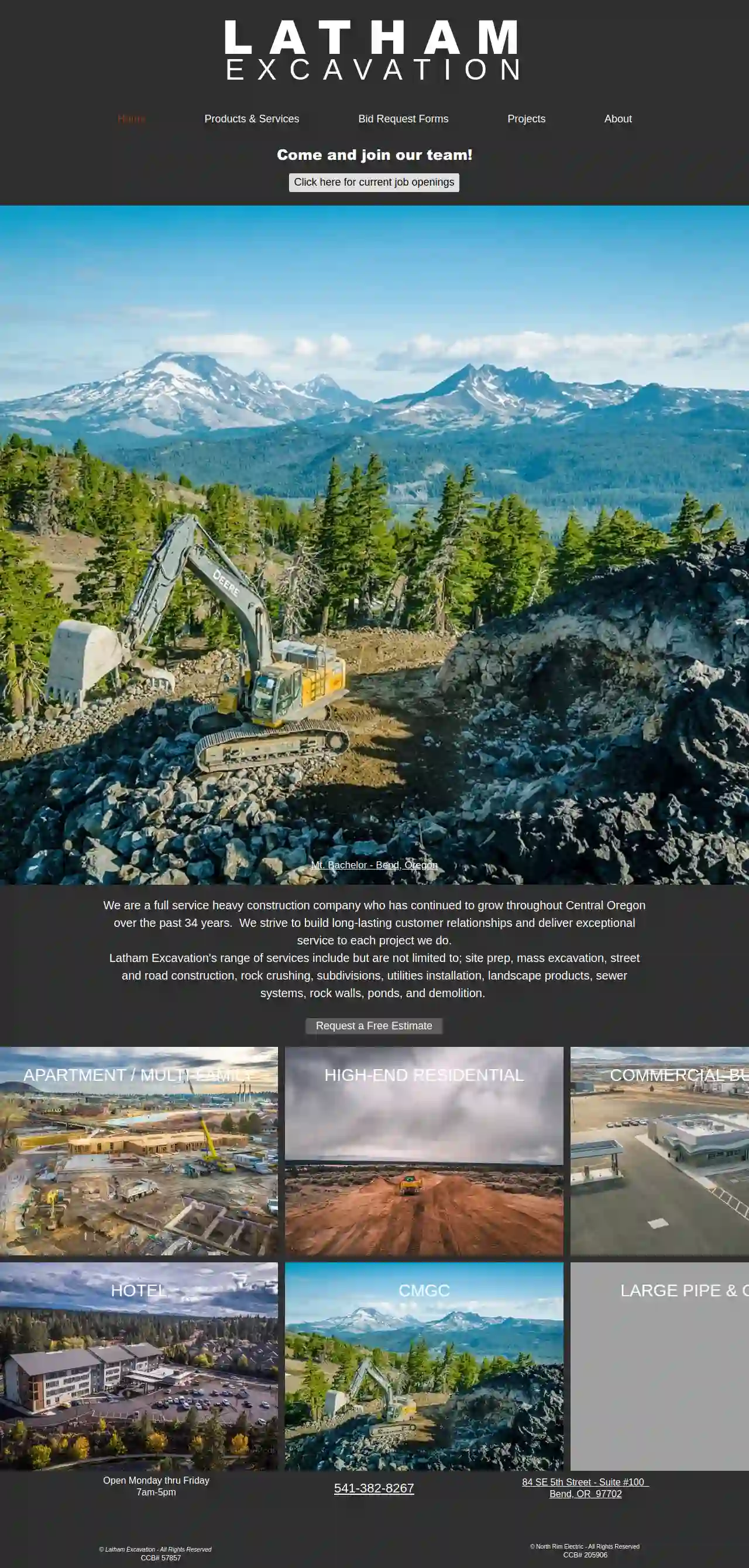
Latham Excavation
3.711 reviews84 SE 5th Street, Suite #100, 84 SE 5th Street - Suite #100, Bend, 97702, USLatham Excavation: Building Central Oregon for 34 Years We are a full-service heavy construction company with a strong commitment to Central Oregon. Our dedication to building long-lasting customer relationships and delivering exceptional service on every project has fueled our growth over the past 34 years. From site preparation and mass excavation to street and road construction, rock crushing, subdivisions, utilities installation, landscape products, sewer systems, rock walls, ponds, and demolition, we offer a comprehensive range of services to meet your needs.
- Services
- Why Us?
- Gallery
Get Quote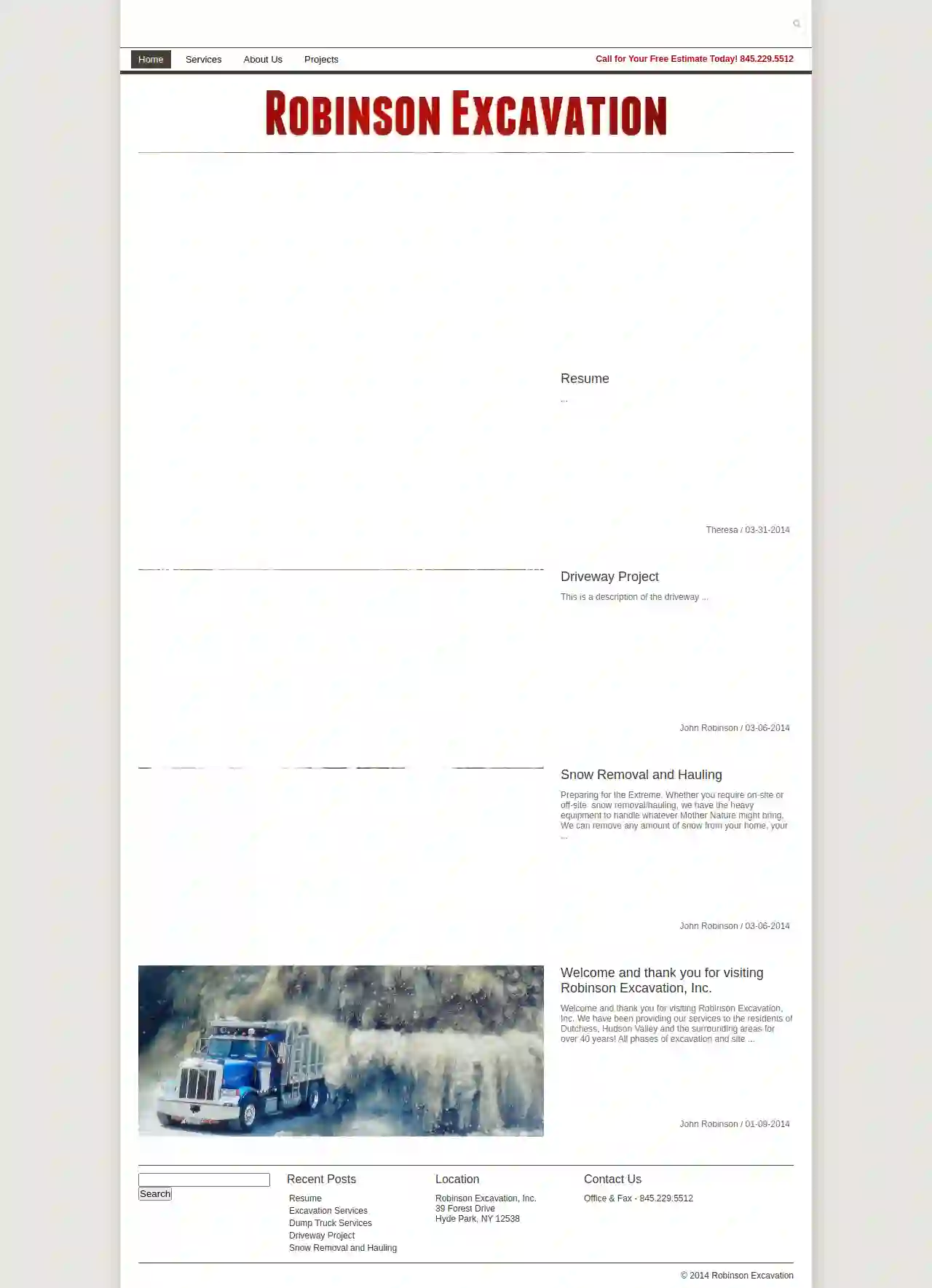
Robinson Excavation, Inc.
51 reviews39 Forest Drive, Hyde Park, 12538, USRobinson Excavation, Inc. - Your Trusted Excavation Partner in Dutchess County and Beyond For over 40 years, Robinson Excavation, Inc. has been a trusted name in Dutchess County, Hudson Valley, and surrounding areas. We are a family-owned and operated business dedicated to providing high-quality excavation and site work services for both residential and commercial clients. Our commitment to excellence, combined with our extensive experience, ensures that every project is completed to the highest standards. We understand that excavation projects can be complex and require a skilled and experienced team. That's why we have assembled a team of dedicated professionals who are passionate about delivering exceptional results. From initial planning to final completion, we work closely with our clients to ensure their vision is realized. We are fully insured and equipped to handle all phases of excavation and site work, no matter how big or small the project. Our services include: - Fix muddy driveways - Fix and replace failing septic systems - Place new septic systems - Municipal water and sewer lines (Town or City) - Footing drains - Dry wells - New foundations - Demolition - Blasting - Trucking - Paving - Delivery of shale, Item 4, all size stone, fill, and topsoil - Complete dump truck service - And much more… We are committed to providing our clients with the highest level of service and satisfaction. We believe in open communication, transparency, and working closely with our clients to ensure their needs are met. Contact us today for a free quote and let us help you bring your project to life.
- Services
- Why Us?
- Gallery
Get Quote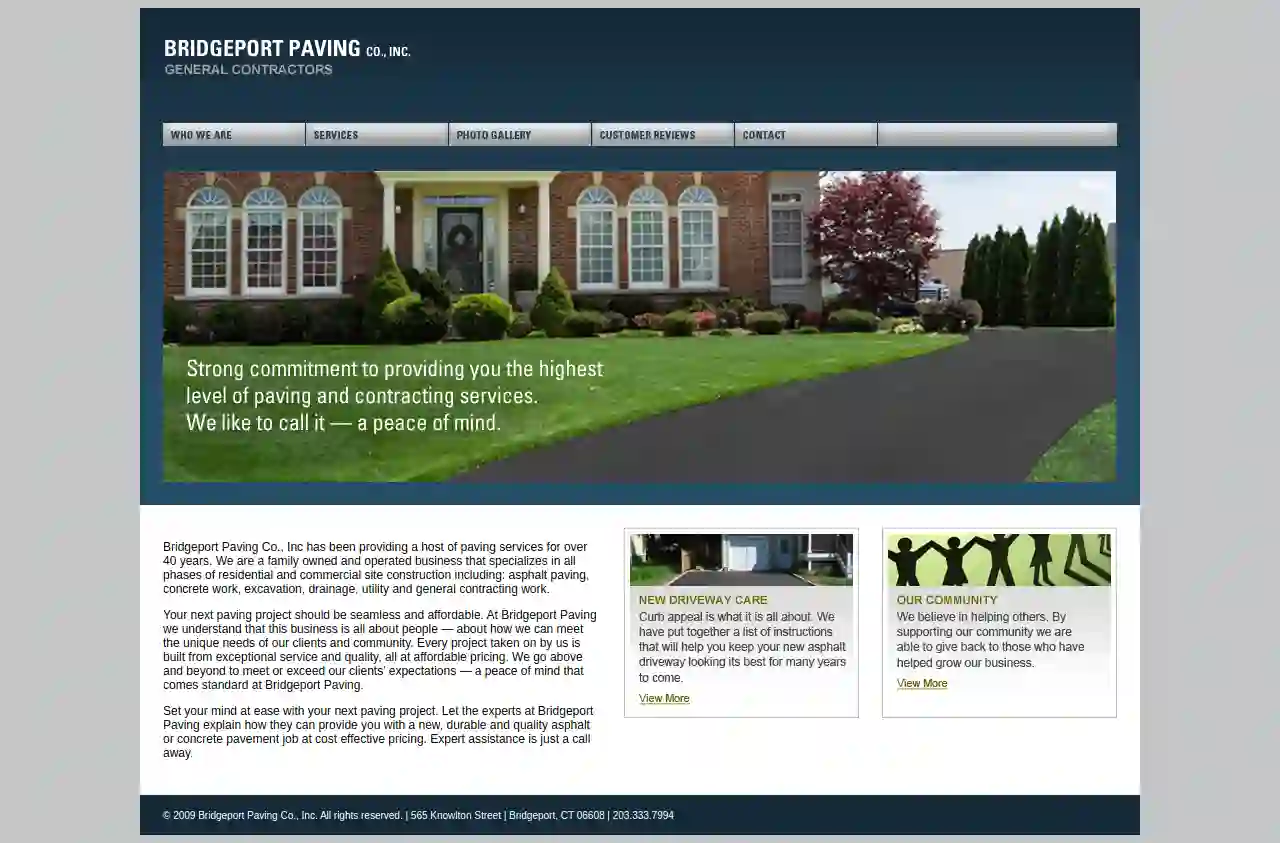
Bridgeport Paving Co Inc
3.52 reviews565 Knowlton Street, Bridgeport, 06608, USBridgeport Paving Co., Inc. has been providing a host of quality paving services for over 40 years. We are a family owned and operated business that specializes in all phases of residential and commercial site construction including: asphalt paving, concrete work, excavation, drainage, utility and general contracting work. Your next paving project should be seamless and affordable. At Bridgeport Paving we understand that this business is all about people — about how we can meet the unique needs of our clients and community. Every project taken on by us is built from exceptional service and quality, all at affordable pricing. We go above and beyond to meet or exceed our clients' expectations — a peace of mind that comes standard at Bridgeport Paving. Set your mind at ease with your next paving project. Let the experts at Bridgeport Paving explain how they can provide you with a new, durable and quality asphalt or concrete pavement job at cost effective pricing. Expert assistance is just a call away.
- Services
- Why Us?
- Testimonials
- Gallery
Get Quote
DLTC Landscape Contractors
4.711 reviews214 Central Ave, Bridgeport, 06607, USDLTC Landscape Contractors is one of the premier commercial landscape companies in Connecticut. We are a family-owned business specializing in the commercial landscape, commercial grounds maintenance and installation, commercial hardscapes, wetland restoration, hydroseeding, and sod installation. The team at DLTC Landscape Contractors is dedicated to providing the best commercial landscape services in Connecticut. From grounds maintenance and installation through to hardscapes, sod installations or wetland restoration; our company will treat your property like it was their own!
- Services
- Why Us?
- Gallery
Get Quote
Structure Tone
52 reviewsStamford, USWho We Are We are a family of companies building amazing spaces across the US, Canada, UK and Ireland. History Founded in 1971, we have grown into an organization made up of over 4,700 employees across 54 offices.
- Services
- Why Us?
- Gallery
Get Quote
Over 22,076+ Excavation Companies in our network
Our excavation providers operate in Northwood & beyond!
ExcavationHQ has curated and vetted Top Excavation Pros in and around Northwood. Find a trustworthy business today.
Frequently Asked Questions About Demolition Contractors
- Clear the Site: Remove all furniture, appliances, personal belongings, and any valuable items from the structure.
- Secure the Perimeter: Fence off the demolition area to prevent unauthorized access and protect surrounding property.
- Disconnect Utilities: Arrange for the disconnection of electricity, gas, water, and other utilities servicing the building.
- Hazardous Material Abatement: If asbestos, lead paint, or other hazardous materials are present, have them professionally removed before demolition begins.
- Notify Neighbors: Inform your neighbors about the demolition schedule to minimize disruptions and address any concerns.
- Obtain Permits: Ensure all necessary demolition permits are in place before starting work.
- Implosion: Using explosives to collapse a structure inwards rapidly. Suitable for large buildings in open areas.
- Wrecking Ball: Swinging a large steel ball to impact and break down the structure. Effective for bringing down walls and other solid elements.
- High-Reach Demolition: Utilizing specialized excavators with extended arms and demolition attachments for dismantling tall structures piece by piece.
- Selective Demolition: Removing specific parts of a building while preserving other sections. Often used in renovation projects.
- Deconstruction: Carefully dismantling a building to salvage reusable materials, reducing waste and environmental impact.
- Site Security: Secure the demolition site with fencing and warning signs to prevent unauthorized access.
- Personal Protective Equipment (PPE): Workers should wear appropriate PPE, including hard hats, safety glasses, gloves, and steel-toe boots.
- Hazardous Material Removal: Properly identify and remove asbestos, lead paint, or other hazardous materials before demolition begins.
- Utility Disconnections: Disconnect all utilities, such as electricity, gas, and water, before demolition.
- Controlled Demolition Techniques: Employ controlled demolition methods to minimize risks and ensure the structure comes down safely.
- Dust Control: Implement dust suppression measures, such as water spraying or misting, to reduce airborne particles and protect air quality.
- Emergency Planning: Have an emergency plan in place, including communication protocols and evacuation procedures, in case of unforeseen events.
- 'Can I see proof of your licensing and insurance?' Verify their credentials and coverage.
- 'What experience do you have with projects like mine?' Ensure they have relevant expertise.
- 'Can you provide references from past clients?' Check their reputation and customer satisfaction.
- 'What are your safety protocols?' Prioritize contractors who emphasize safety.
- 'How will you handle hazardous materials?' Ensure they have proper procedures for asbestos or lead abatement.
- 'What is your timeline for completing the project?' Understand the project duration.
- 'How will you manage noise, dust, and debris?' Discuss mitigation measures for minimizing disruption.
- 'What are your payment terms?' Clarify payment schedules and any required deposits.
How do I prepare my property for demolition?
What are the different types of demolition?
What are the safety precautions for demolition?
What questions should I ask a demolition contractor before hiring them?
How do I prepare my property for demolition?
- Clear the Site: Remove all furniture, appliances, personal belongings, and any valuable items from the structure.
- Secure the Perimeter: Fence off the demolition area to prevent unauthorized access and protect surrounding property.
- Disconnect Utilities: Arrange for the disconnection of electricity, gas, water, and other utilities servicing the building.
- Hazardous Material Abatement: If asbestos, lead paint, or other hazardous materials are present, have them professionally removed before demolition begins.
- Notify Neighbors: Inform your neighbors about the demolition schedule to minimize disruptions and address any concerns.
- Obtain Permits: Ensure all necessary demolition permits are in place before starting work.
What are the different types of demolition?
- Implosion: Using explosives to collapse a structure inwards rapidly. Suitable for large buildings in open areas.
- Wrecking Ball: Swinging a large steel ball to impact and break down the structure. Effective for bringing down walls and other solid elements.
- High-Reach Demolition: Utilizing specialized excavators with extended arms and demolition attachments for dismantling tall structures piece by piece.
- Selective Demolition: Removing specific parts of a building while preserving other sections. Often used in renovation projects.
- Deconstruction: Carefully dismantling a building to salvage reusable materials, reducing waste and environmental impact.
What are the safety precautions for demolition?
- Site Security: Secure the demolition site with fencing and warning signs to prevent unauthorized access.
- Personal Protective Equipment (PPE): Workers should wear appropriate PPE, including hard hats, safety glasses, gloves, and steel-toe boots.
- Hazardous Material Removal: Properly identify and remove asbestos, lead paint, or other hazardous materials before demolition begins.
- Utility Disconnections: Disconnect all utilities, such as electricity, gas, and water, before demolition.
- Controlled Demolition Techniques: Employ controlled demolition methods to minimize risks and ensure the structure comes down safely.
- Dust Control: Implement dust suppression measures, such as water spraying or misting, to reduce airborne particles and protect air quality.
- Emergency Planning: Have an emergency plan in place, including communication protocols and evacuation procedures, in case of unforeseen events.
What questions should I ask a demolition contractor before hiring them?
- 'Can I see proof of your licensing and insurance?' Verify their credentials and coverage.
- 'What experience do you have with projects like mine?' Ensure they have relevant expertise.
- 'Can you provide references from past clients?' Check their reputation and customer satisfaction.
- 'What are your safety protocols?' Prioritize contractors who emphasize safety.
- 'How will you handle hazardous materials?' Ensure they have proper procedures for asbestos or lead abatement.
- 'What is your timeline for completing the project?' Understand the project duration.
- 'How will you manage noise, dust, and debris?' Discuss mitigation measures for minimizing disruption.
- 'What are your payment terms?' Clarify payment schedules and any required deposits.